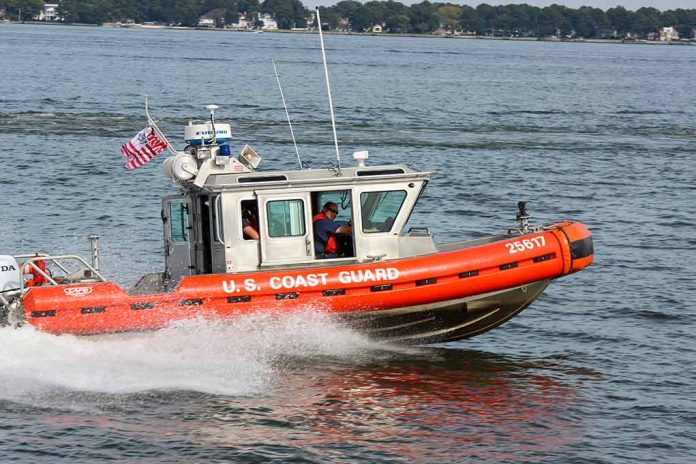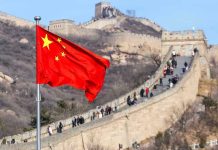
The U.S. Coast Guard intercepted a vessel carrying nearly 400 pounds of cocaine off the coast of Puerto Rico, leading to the arrest of two U.S. citizens.
At a Glance
- Coast Guard seized 142 packages of cocaine valued at $4.3 million
- Two U.S. citizens arrested, facing potential life sentences
- Interception part of multi-agency Caribbean Corridor Strike Force
- Puerto Rico known as transit point for drugs smuggled to U.S. mainland
Major Drug Bust in Caribbean Waters
The U.S. Coast Guard’s Joseph Tezanos cutter intercepted a suspicious vessel in international waters heading towards Rincón, Puerto Rico. The operation resulted in the seizure of 142 “brick-sized packages” of cocaine, with an estimated street value of $4.3 million. Two men, both U.S. citizens, were taken into custody by the Drug Enforcement Administration (DEA) and now face federal charges that could result in sentences ranging from 10 years to life in prison.
This significant seizure is part of ongoing efforts by the Caribbean Corridor Strike Force, a multi-agency initiative involving the DEA, FBI, Coast Guard, Homeland Security, and Immigration and Customs Enforcement (ICE). The operation underscores the continued vigilance of maritime law enforcement in combating drug trafficking in coastal waters.
Puerto Rico: A Key Transit Point
Puerto Rico’s strategic location has made it a known transit point for drugs smuggled to the U.S. mainland and other countries. This recent seizure is not an isolated incident. In early September, $33 million worth of cocaine was also discovered on a beach in Puerto Rico, and in August, authorities seized over 660 pounds of cocaine from another boat.
“Two men are in the custody of the Drug Enforcement Agency after Coast Guard officials seized nearly 400 pounds of cocaine from a boat in Puerto Rico.”
The frequency and scale of these seizures highlight the ongoing challenge faced by law enforcement agencies in stemming the flow of illegal narcotics through the Caribbean. The Coast Guard’s success in this operation demonstrates the effectiveness of coordinated efforts in disrupting drug trafficking networks.
Broader Impact of Coast Guard Operations
The Coast Guard’s efforts extend beyond this single operation. In a separate incident, the Coast Guard Cutter Robert Yered offloaded over 1,380 pounds of cocaine in Miami Beach, valued at approximately $18.1 million. This interdiction in the Caribbean Sea involved a U.S. Coast Guard law enforcement detachment aboard a U.S. Navy ship, showcasing the inter-service cooperation in these high-stakes operations.
“I congratulate the United States Coast Guard personnel for this successful interdiction of an international drug smuggling venture,” said United States Attorney W. Stephen Muldrow in the news release. “We greatly appreciate the U.S. Coast Guard’s unwavering support and dedication to keeping Puerto Rico and our nation safe.”
These operations are part of the Organized Crime Drug Enforcement Task Forces (OCDETF) Strike Force Initiative, which aims to identify, disrupt, and dismantle high-level criminal organizations. The multi-agency approach, coordinated by the Joint Interagency Task Force South in Key West, Florida, has proven effective in detecting and intercepting illegal drug transits.
Continuous Battle Against Drug Trafficking
The Coast Guard’s efforts in combating drug trafficking are relentless and wide-ranging. In a massive operation, the Coast Guard Cutter Hamilton crew offloaded approximately 26.5 tons of cocaine in Port Everglades, Florida. This cocaine, worth an estimated $715 million wholesale, was seized in international waters off the Eastern Pacific Ocean in multiple operations since October 1, 2016.
The scale of these operations underscores the persistent threat posed by international drug cartels and the commitment of U.S. law enforcement agencies to disrupt their activities. As drug traffickers continue to evolve their methods, including the use of semi-submersible vessels or “narco subs,” the Coast Guard and its partners remain vigilant, adapting their strategies to meet these challenges head-on.
The recent successes in drug interdiction not only keep dangerous substances off the streets but also deal significant blows to the financial operations of criminal networks. As the battle against drug trafficking continues, the Coast Guard’s role in maritime law enforcement remains crucial in safeguarding national security and public health.













